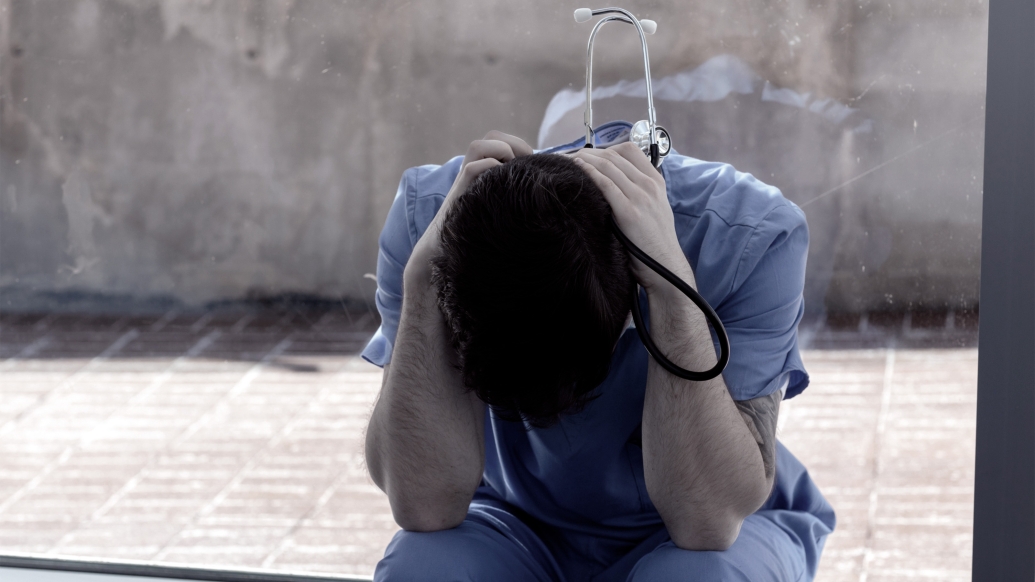Researchers who have led work on stress, depression and wellbeing in physicians say progress is being made but more can be done, including addressing key research questions

Written by Kristen Drew, Medical University of South Carolina
It’s critical for hospital systems and medical schools to implement a set of established, evidence-based strategies in order to address the crisis in physician wellbeing, a team from the Medical University of South Carolina and the University of Michigan writes in a new article in the New England Journal of Medicine.
“This is really about the future of health care,” said Constance Guille, M.D., a professor in the department of Psychiatry and Behavioral Sciences at the Medical University of South Carolina.
“We need to think about what we’re doing now in order to create the healthiest workforce moving forward.”
Guille co-authored the review article with Srijan Sen, M.D., Ph.D., the Eisenberg Professor of Depression and Neurosciences at the University of Michigan Medical School, entitled “Burnout, Depression, and Diminished WellBeing among Physicians.”
The article takes inventory of the physician wellbeing research and efforts to date, and provides a clear path for how healthcare systems can improve physician health and advance the research that is needed to propel the field forward.
The authors and their teams have spent more than almost two decades studying the mental and physical health of over 28,000 physicians in their first year of post-medical school training, through the Intern Health Study.
The study has helped to identify workload as the strongest and most consistent factor associated with wellbeing.
The study has also identified other key drivers of resident depression and developed interventions to improve wellbeing.
Sen, who is the director of the Eisenberg Family Depression Center at U-M, said, “The fundamental problem is that we are asking too few physicians to do too much work. In the population of resident physicians, reforms over the past 15 years have substantially reduced work hours. We have found that this work hour reduction has facilitated meaningful improvement in wellbeing. We believe further efforts to reduce workload and work hours is the key further wellbeing improvement among residents and among the broader physician population.”
In addition to policies to reduce workload, the authors recommend policies that facilitate timely, confidential and accessible mental health treatment for physicians.
We believe further efforts to reduce workload and work hours is the key further well-being improvement among residents and among the broader physician population."
-Srijan Sen, M.D., Ph.D.
The review also found that physicians in underrepresented groups, such as women and those from minority racial and ethnic groups, face distinctive stressors that affect wellbeing, such as discrimination, harassment, sexism and racism in medicine.
Policies supporting changes in culture are needed to improve physician well-being and attract and retain the workforce to meet the needs of patients.
SEE ALSO: The data says we need to talk about physician mental health early
“Women and minorities need to be in the conversation about how we move forward because their experiences vary,” Guille said.
“They are disproportionately affected by work-family conflict and institutional and individual discrimination that minorities and underrepresented groups face. Their perspective is critical in creating a healthier workplace and in turn better patient care,” Guille said.
Many health systems have made efforts in recent years to improve physician well-being, largely related to reducing workloads and fostering a supportive culture.
For example, MUSC and U-M have added nonphysician team members to complete tasks previously completed by physicians (e.g., entering information into patients’ electronic health records).
The health systems have also appointed chief wellbeing officers to coordinate and enhance programs for physicians and other members of the health care workforce.
Despite the progress, Guille and Sen say there is still much work to be done to ensure the wellbeing of physicians.
Here are the next steps the authors recommend all health systems take:
- Implement and prioritize interventions that target work hours and workload
- Eliminate policies that discourage physicians from seeking treatment for mental health or substance use disorders
- Implement policies and programs that improve parental and caregiving leave and increase access to childcare
- Implement policies that support diversity, equity and inclusion and that target sexism and racism in medicine
In parallel, there is a need for greater scientific rigor in the field of physician burnout and wellbeing.
Next steps for researchers are to employ valid assessments of wellbeing and depression, determine effective implementation and dissemination strategies for established interventions and develop and evaluate new targeted interventions to improve wellbeing for all physicians.
Sen said, “Our research on physicians in what is considered the most stressful year of a medical career can inform efforts to support physicians throughout their work lives, at a time when our nation needs them more than ever.”
Paper cited: “Burnout, Depression, and Diminished Well-Being among Physicians,” NEJM. DOI: 10.1056/NEJMra2302878
Sign up for Health Lab newsletters today. Get medical tips from top experts and learn about new scientific discoveries every week.
Sign up for the Health Lab Podcast. Add us wherever you listen to your favorite shows.

Explore a variety of health care news & stories by visiting the Health Lab home page for more articles.

Department of Communication at Michigan Medicine

Center Director
Want top health & research news weekly? Sign up for Health Lab’s newsletters today!





